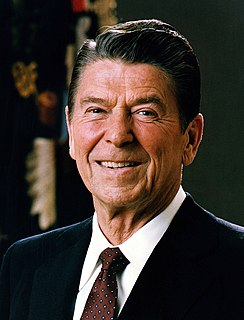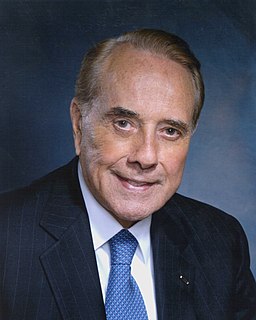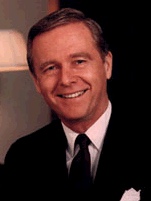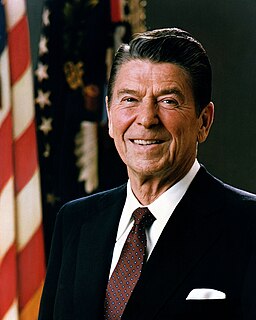
Thomas Miller McClintock II is an American politician who is the U.S. Representative for California's 4th congressional district, serving since 2009. A member of the Republican Party, he previously served as an assemblyman and state senator. McClintock unsuccessfully ran for Governor of California in the California recall election and for Lieutenant Governor of California in the 2006 election.

Edmund Gerald "Pat" Brown Sr. was an American politician and lawyer who served as the 32nd Governor of California from 1959 to 1967. Born in San Francisco, Brown had an early interest in speaking and politics; he earned a LL.B. degree in 1927, and subsequently began legal practice. His first elected office was as district attorney for San Francisco, he was elected attorney general of California in 1950 before becoming the state's governor in 1959. As governor, Brown embarked on massive projects, building important infrastructure and redefining the state's higher education system. He was never a serious contender in the national conventions, although frequently on primary ballots as California's favorite son. He lost his bid for a third term as governor in 1966 to future President Ronald Reagan, but his legacy has since earned him regard as the builder of modern California. His son Edmund G. "Jerry" Brown Jr. was the 34th and 39th Governor of California; his daughter, Kathleen Brown, was the 29th California State Treasurer.

The 1986 United States Senate elections was an election for the United States Senate in the middle of Ronald Reagan's second presidential term. The Republicans had to defend an unusually large number of freshman Senate incumbents who had been elected on President Ronald Reagan's coattails in 1980. Democrats won a net of eight seats, defeating seven freshman incumbents and regaining control of the Senate for the first time since January 1981. The party not controlling the presidency gained seats, as usually occurs in mid-term elections.

The 1982 United States Senate elections were held on November 2, 1982. They were elections for the United States Senate following Republican gains in 1980. A total of four seats changed hands between parties, and the lone independent, Senator Harry Byrd Jr., retired. Democrats made a net gain of one seat in the elections. A special election in 1983 was then held after the winner of Washington's 1982 election died at the beginning of the term.

The 1980 United States Senate elections coincided with Ronald Reagan's victory in the presidential election. Reagan's large margin of victory over incumbent Jimmy Carter pulled in many Democratic voters and gave a huge boost to Republican Senate candidates.

The 2006 California gubernatorial election occurred on November 7, 2006. The primary elections took place on June 6, 2006. The incumbent Republican Governor, Arnold Schwarzenegger, won re-election for his first and only full term. His main opponent was California State Treasurer Phil Angelides, the California Democratic Party nominee. Peter Camejo was the California Green Party nominee, Janice Jordan was the Peace and Freedom Party nominee, Art Olivier was the California Libertarian Party nominee, and Edward C. Noonan was the California American Independent Party nominee.

The 1998 California gubernatorial election was an election that occurred on November 3, 1998, resulting in the election of Gray Davis, the state's first Democratic governor in 16 years. Davis won the general election by an almost 20% margin over his closest opponent, Republican Dan Lungren. Davis succeeded Pete Wilson who was term limited.
Houston Irving Flournoy was an American politician who served as a California legislator and State Controller. He later became a professor of public administration at the University of Southern California (USC).

The California gubernatorial election, 1966 was held on November 8, 1966. The election was a contest between incumbent Governor Pat Brown, the Democratic candidate, and actor Ronald Reagan, the Republican candidate. Reagan mobilized conservative voters and defeated Brown.

The Massachusetts Senate election of 1984 was held in November 1984. The election was won by Democrat John Kerry, the Lieutenant Governor of Massachusetts who remained Senator until 2013 when he resigned to become U.S. Secretary of State. One-term incumbent Paul Tsongas declined to seek re-election and retired from the Senate following a battle with cancer.

The California gubernatorial election, 1970 was held on November 3, 1970. The incumbent, Republican Ronald Reagan, won re-election over Democrat and Speaker of the Assembly Jesse "Big Daddy" Unruh.

The 2008 Montana gubernatorial election was held on November 4, 2008 to elect the governor and lieutenant governor of the U.S. state of Montana. Incumbent Governor Brian Schweitzer, a Democrat who was elected to his first four-year term in 2004, was elected to a second term with 65.5 per cent of the vote. John Bohlinger, a Republican and the incumbent lieutenant governor, was once again Schweitzer's running mate, and was re-elected to a second term. The Republican nominee was Roy Brown, a member of the Montana Senate. Brown's running mate was businessman, and future U.S. Representative and U.S. Senator, Steve Daines.

The 1980 Republican presidential primaries were the selection process by which voters of the Republican Party chose its nominee for President of the United States in the 1980 U.S. presidential election. Former California Governor Ronald Reagan was selected as the nominee through a series of primary elections and caucuses culminating in the Republican National Convention held from July 14 to July 17, 1980, in Detroit, Michigan.

The 1996 Republican presidential primaries were the selection process by which voters of the Republican Party chose its nominee for President of the United States in the 1996 U.S. presidential election. Former Senator Bob Dole of Kansas, former Senate Majority Leader was selected as the nominee through a series of primary elections and caucuses culminating in the 1996 Republican National Convention held from August 12 to August 15, 1996, in San Diego, California.

The electoral history of Jerry Brown, California Governor, Secretary of State, Attorney General; and Mayor of Oakland.

The 1982 United States Senate election in California took place on November 2, 1982. Incumbent Republican U.S. Senator S. I. Hayakawa decided to retire after one term. Republican Pete Wilson won the open seat.

The 2014 California gubernatorial election was held on November 4, 2014, to elect the Governor of California, concurrently with elections for the rest of California's executive branch, as well as elections to the United States Senate in other states and elections to the United States House of Representatives and various state and local elections.

A general election was held in the U.S. state of Arizona on November 6, 2018. All of Arizona's executive offices were up for election as well as a United States Senate seat and all of Arizona's nine seats in the United States House of Representatives. The Democratic Party picked up three statewide offices, as well as a seat in the U.S. House.
Frank M. Jordan (1888–1970) was the 22nd Secretary of State of California. He was the son of Frank C. Jordan, California's Secretary of State from 1911-1940. When the younger Jordan defeated interim appointee Paul Peek in 1942, he became the first man in the history of California to be elected to succeed his father in a constitutional state office. His early death in office is notable for indirectly launching the career of Jerry Brown, and he suggested that blue and gold be made the official colors of the state of California.






















